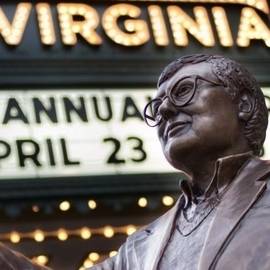From April 15–19, the Virginia Theater in downtown Champaign will again play host to the film-fueled, synapse-sparking revival that is Ebertfest. Spearheaded once again by Chaz Ebert and featuring panelists and critics as well as directors, actors, and other prominent movie minds, this year’s festival runs the gamut from the brilliant to the obscure—not that there’s always a difference.
Here — with handy visual aids, personal asides, and excerpts from reviews found on rogerebert.com — are the schedule’s banner headlines.
WEDNESDAY, APRIL 15th
7 p.m. – Goodbye to Language, with actor Heloise Godet
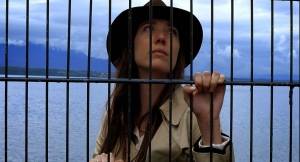 Where to begin? Much of the film is built around a young couple at a lake house who do a lot of arguing and also spend a lot of time naked. (Much of this feels like a self-parody of European art cinema tendencies: How can I get people to sit still for an extended discussion of politics and language? By having attractive people take their clothes off, of course.) But these characters one just anchor points for, essentially, a feature length montage, much of it quickly edited, with few shots held longer than three or four seconds. The style might be irritating in a traditional narrative film. But it seems of a piece in a movie that is partly about (Godard’s films are always “about” more than one thing—and often only partly about any of them) the impossibility of focusing, concentrating, and comprehending history, and politics, and the written and spoken word, then making all of it make some kind of sense, if only to yourself. If Terrence Malick tried to make a Godard film in the spirit of Godard, it might look something like this, though with less prolonged discussion of Hitler, the Holocaust, colonialism, imperialism and other favorite Godard subjects, but with Godard’s cryptic voice-over aphorisms… (Review excerpt, Matt Zoler Seitz)
Where to begin? Much of the film is built around a young couple at a lake house who do a lot of arguing and also spend a lot of time naked. (Much of this feels like a self-parody of European art cinema tendencies: How can I get people to sit still for an extended discussion of politics and language? By having attractive people take their clothes off, of course.) But these characters one just anchor points for, essentially, a feature length montage, much of it quickly edited, with few shots held longer than three or four seconds. The style might be irritating in a traditional narrative film. But it seems of a piece in a movie that is partly about (Godard’s films are always “about” more than one thing—and often only partly about any of them) the impossibility of focusing, concentrating, and comprehending history, and politics, and the written and spoken word, then making all of it make some kind of sense, if only to yourself. If Terrence Malick tried to make a Godard film in the spirit of Godard, it might look something like this, though with less prolonged discussion of Hitler, the Holocaust, colonialism, imperialism and other favorite Godard subjects, but with Godard’s cryptic voice-over aphorisms… (Review excerpt, Matt Zoler Seitz)
9:30 p.m. – Tribute to Harold Ramis with Erica Ramis, Trevor Albert, and Laurel Ward
 Harold Ramis was responsible for some of the greatest comedy moments of the 20th century. Not just as a writer (Caddyshack and Stripes would be enough to put him on Comedy Mount Rushmore, but there are so many are others); not just as a director (National Lampoon’s Vacation and Groundhog Day? C’mon!); but also as a very fine actor (Egon Spengler in Ghostbusters). This panel discussion of his work, featuring his wife, Erica, will pay tribute to Ramis’s particular genius and enduring popularity. The News-Gazette has speculated that Bill Murray might show up. Stranger things have happened, especially were Murray is concerned, but please don’t show up for that reason. Go because it’s a chance to celebrate a great filmmaker and laugh with others who miss him. If nothing else gets to the heart of Ebertfest, that just might.
Harold Ramis was responsible for some of the greatest comedy moments of the 20th century. Not just as a writer (Caddyshack and Stripes would be enough to put him on Comedy Mount Rushmore, but there are so many are others); not just as a director (National Lampoon’s Vacation and Groundhog Day? C’mon!); but also as a very fine actor (Egon Spengler in Ghostbusters). This panel discussion of his work, featuring his wife, Erica, will pay tribute to Ramis’s particular genius and enduring popularity. The News-Gazette has speculated that Bill Murray might show up. Stranger things have happened, especially were Murray is concerned, but please don’t show up for that reason. Go because it’s a chance to celebrate a great filmmaker and laugh with others who miss him. If nothing else gets to the heart of Ebertfest, that just might.
THURSDAY, APRIL 16th
1 p.m. – A Pigeon Sat on a Branch Reflecting on Existence, with producer Johan Carlsson
 Pigeon consists of vignettes, scenes in which the camera never moves, as if we’re watching a series of brief one-act plays. The curtain goes up, we watch anywhere from a few seconds to a few minutes, and then the curtain falls again, rising anew on an entirely new scene.
Pigeon consists of vignettes, scenes in which the camera never moves, as if we’re watching a series of brief one-act plays. The curtain goes up, we watch anywhere from a few seconds to a few minutes, and then the curtain falls again, rising anew on an entirely new scene.
The vignettes are sometimes loosely connected — we regularly return to a pair of novelty gag gift salesmen who sell vampire teeth, a bag of canned laughter and a grotesque mask with deadpan delivery — and sometimes have no connection at all. (Review excerpt, Brian Tallerico)
4 p.m. – Moving Midway, with writer/director Godfrey Cheshire
This is one of only two films in this year’s festival that received reviews from Mr. Ebert himself. You can read the review in its entirety here.
8:30 p.m. – The End of the Tour, with director James Ponsoldt and actor Jason Segel
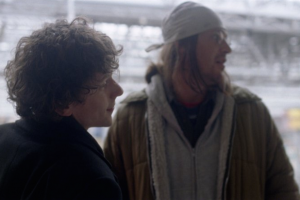 The End of the Tour opens in 2008, as Lipsky hears of the death of Wallace. He pulls out the old tapes of his interviews (having to vulture batteries from his toothbrush to put in an old recorder) and the bulk of the film takes place in 1996, when Lipsky worked for Rolling Stone and convinced his editor to expense an interview with the writer recently deemed the most important in his field. Lipsky travels to Wallace’s nondescript home on a traffic-filled road, where he meets two rambunctious dogs, tries to chew tobacco for the first time, and notes that the place looks like a frat house. Is this how the voice of a generation lives? For the next five days, Wallace and Lipsky talk…and talk…and talk. The End of the Tour is very comparable to Richard Linklater’s “Before” movies in the way that its greatest pleasures come not from narrative but discussion, and in how both films present chance encounters as life-shaping events. (Review excerpt, Brian Tallerico)
The End of the Tour opens in 2008, as Lipsky hears of the death of Wallace. He pulls out the old tapes of his interviews (having to vulture batteries from his toothbrush to put in an old recorder) and the bulk of the film takes place in 1996, when Lipsky worked for Rolling Stone and convinced his editor to expense an interview with the writer recently deemed the most important in his field. Lipsky travels to Wallace’s nondescript home on a traffic-filled road, where he meets two rambunctious dogs, tries to chew tobacco for the first time, and notes that the place looks like a frat house. Is this how the voice of a generation lives? For the next five days, Wallace and Lipsky talk…and talk…and talk. The End of the Tour is very comparable to Richard Linklater’s “Before” movies in the way that its greatest pleasures come not from narrative but discussion, and in how both films present chance encounters as life-shaping events. (Review excerpt, Brian Tallerico)
FRIDAY, APRIL 17
1 p.m. – Girlhood
 Girlhood follows Marieme (the extraordinary Karidja Touré) through her 16th year. She lives in a big housing project, and is the main caretaker of her younger sister. Her grades are poor and she is being pushed to transfer to a technical school and learn a trade. Her mother (Binta Diop) works so many jobs she is never around, and Marieme has to answer to her brother (Cyril Mendy), who is downright abusive. Marieme is a sweet and shy girl, her hair falling down her back in braids. One day three tough Rizzo-types, lolling on the bleachers, summon her over to their pow-wow. Their motivations aren’t clear at first. Marieme seems much younger than these glamour girls, all of whom wear long straight weaves, identical gold necklaces, and red lipstick. The cliche is that the “bad girls” will “corrupt” the good girl. But Sciamma is up to something different, thank goodness. (Review excerpt, Sheila O’Malley)
Girlhood follows Marieme (the extraordinary Karidja Touré) through her 16th year. She lives in a big housing project, and is the main caretaker of her younger sister. Her grades are poor and she is being pushed to transfer to a technical school and learn a trade. Her mother (Binta Diop) works so many jobs she is never around, and Marieme has to answer to her brother (Cyril Mendy), who is downright abusive. Marieme is a sweet and shy girl, her hair falling down her back in braids. One day three tough Rizzo-types, lolling on the bleachers, summon her over to their pow-wow. Their motivations aren’t clear at first. Marieme seems much younger than these glamour girls, all of whom wear long straight weaves, identical gold necklaces, and red lipstick. The cliche is that the “bad girls” will “corrupt” the good girl. But Sciamma is up to something different, thank goodness. (Review excerpt, Sheila O’Malley)
4 p.m. – The Son of the Sheik, featuring Alloy Orchestra
8:30 p.m. – A Bronx Tale, with actor/writer Chazz Palminteri, and producer Jon Kilik
As was the case with Moving Midway, Mr. Ebert reviewed this film (back in 1993). I’m not going to summarize what he said or excise a piece of it. Go to the website and read the whole thing.
SATURDAY, APRIL 18th
11 a.m. – Wild Tales, with actor Julieta Zylberberg and casting director Javier Braier
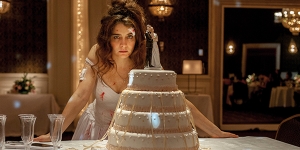 Multi-story feature films are not the happiest of genres, for reasons that are usually very apparent. For one, having to conclude one story and start another, over and over, interrupts the dream-like flow that most moviegoers expect of features. For another, unevenness is almost built into the form: some stories will be better than others, perhaps especially when several filmmakers are involved.
Multi-story feature films are not the happiest of genres, for reasons that are usually very apparent. For one, having to conclude one story and start another, over and over, interrupts the dream-like flow that most moviegoers expect of features. For another, unevenness is almost built into the form: some stories will be better than others, perhaps especially when several filmmakers are involved.
All of these inherent drawbacks help explain why Argentina’s Wild Tales comes as such an extraordinary surprise. Perhaps the best multi-story feature this reviewer has ever seen, the Sony Classics release, a nominee for this year’s Best Foreign-Language Film Oscar, deserves to become a serious art-house hit in the U.S. thanks to its skill in deftly overcoming the form’s usual deficits, for a result that feels as amazingly cohesive as it is relentlessly clever and entertaining. (Review excerpt, Godfrey Cheshire)
2 p.m. – Ida
 Anna (Agata Trzebokowska) is an 18-year-old orphan who was raised in that convent and is preparing to take her vows when her Mother Superior insists that first she meet her one known relative. That is an aunt, Wanda (Agneta Kulesza), a former prosecutor with a high Communist Party rank whose dissolute life of smoking, drinking and bedding men stands in stark contrast to the ascetic existence of her sheltered niece. But Anna has more to be shocked about when Wanda tells her that her real name is Ida (pronounced Eeda), that she is Jewish and that her parents were killed during World War II.
Anna (Agata Trzebokowska) is an 18-year-old orphan who was raised in that convent and is preparing to take her vows when her Mother Superior insists that first she meet her one known relative. That is an aunt, Wanda (Agneta Kulesza), a former prosecutor with a high Communist Party rank whose dissolute life of smoking, drinking and bedding men stands in stark contrast to the ascetic existence of her sheltered niece. But Anna has more to be shocked about when Wanda tells her that her real name is Ida (pronounced Eeda), that she is Jewish and that her parents were killed during World War II.
Few recent films can claim a visual approach as striking as that which cinematographers Lukasz Zal and Ryszard Lenczewski give Ida. Filmed in the unusual, boxy aspect ratio of 1.37:1, and most often deployed in static long shots, the film’s images sometimes suggest Vermeer lighting with the color taken away, and the compositions manage to seem at once classical and off-handed, with the subjects often located in the screen’s two bottom quadrants. As in Bresson, the effect is to draw the viewer’s eye into the beauty of the image while simultaneously maintaining a contemplative distance from the drama. (Review excerpt, Godrey Chesire)
5 p.m. – The Motel Life, with director Alan Polsky and actor Stephen Dorff
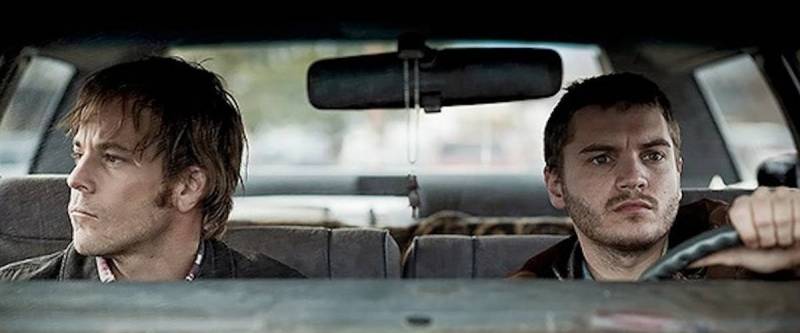
Based on the debut novel by musician Willy Vlautin, The Motel Life could have been a schmaltzy mess in less sensitive hands. It could have made kitschy and quirky that which is essentially poignant and heartfelt. But the directors and the cast, through a miracle of tone, mood, and emotion, have made a film that feels true, that is sweet and sharp and unbearable. Every frame feels right, every choice feels thought-out, considered. All adds up to a heartbreaking whole. (Review excerpt, Sheila O’Malley)
I’m going to extemporize a bit here on The Motel Life because I truly believe that it exemplifies the spirit of Ebertfest. If you’ll recall, all of this began back in 1999 as Roger Ebert’s Overlooked Film Festival. I’m willing to bet that most if not all of the folks in Saturday night’s audience will not have seen The Motel Life prior to this year’s festival. I hadn’t seen it myself until last week. And now that I have, I can say that it has terrific, genuine performances and a story that is at once simple and imaginative.
I can also say, having thought about the film for a couple of days, that I did not like it. But that’s the point. I saw it, and I would love to discuss it with people. There are good things in it, and I want to know what other movie-lovers think about it. And that is precisely why films like this should be (and are) shown at festivals like this one.
9 p.m. – 99 Homes, with director/co-writer Ramin Bahrani, and actor Noah Lomax
 99 Homes plays like a thriller but it’s grounded by the three-dimensional performances from (Andrew) Garfield and (Michael) Shannon. The former finds the emotional rhythm of a man without many options left. As so many people in this world are, Dennis is forced into a situation he didn’t create and can’t avoid. And you can see the inner turmoil in Garfield’s eyes. There’s less of a moral center in Shannon’s fantastic work as Carver, but that’s what makes him so interesting. Shannon wisely avoids turning him into a cartoon, even finding the realism in this real estate shark. He’s using a corrupt system to his advantage. When he says, “Only 1 in 100 is going to get on that Ark, son,” who can blame him for trying to keep from drowning? Like all great socially conscious films, 99 Homes doesn’t portray its issues in black and white, and Garfield and Shannon’s nuanced work is what makes that gray area effective. (Review excerpt, Brian Tallerico)
99 Homes plays like a thriller but it’s grounded by the three-dimensional performances from (Andrew) Garfield and (Michael) Shannon. The former finds the emotional rhythm of a man without many options left. As so many people in this world are, Dennis is forced into a situation he didn’t create and can’t avoid. And you can see the inner turmoil in Garfield’s eyes. There’s less of a moral center in Shannon’s fantastic work as Carver, but that’s what makes him so interesting. Shannon wisely avoids turning him into a cartoon, even finding the realism in this real estate shark. He’s using a corrupt system to his advantage. When he says, “Only 1 in 100 is going to get on that Ark, son,” who can blame him for trying to keep from drowning? Like all great socially conscious films, 99 Homes doesn’t portray its issues in black and white, and Garfield and Shannon’s nuanced work is what makes that gray area effective. (Review excerpt, Brian Tallerico)
SUNDAY, APRIL 19
11 a.m. – Seymour: An Introduction, with subject Seymour Bernstein
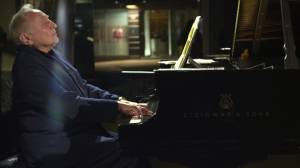 The title of the new documentary directed by and featuring Ethan Hawke provides a vague indication of the work’s eventual assets and liabilities. On one level, the title is straightforward: the movie does introduce viewers to Seymour Bernstein, a classical pianist in his 80s who, at the midpoint of his life, gave up public performances and became a teacher of piano instead. Then there’s the allusion to J.D. Salinger’s novella, an account of the precocious genius of the Glass family, by now something of an American literary legend …
The title of the new documentary directed by and featuring Ethan Hawke provides a vague indication of the work’s eventual assets and liabilities. On one level, the title is straightforward: the movie does introduce viewers to Seymour Bernstein, a classical pianist in his 80s who, at the midpoint of his life, gave up public performances and became a teacher of piano instead. Then there’s the allusion to J.D. Salinger’s novella, an account of the precocious genius of the Glass family, by now something of an American literary legend …
Hawke might have more appropriately called his short feature Seymour: An Interrogation, because while the film lays out Bernstein’s life story and his perceptions on art, and explores his talent, Hawke makes clear from the outset that he chose Bernstein as a subject (the two met when seated next to each other at a dinner party) in order to explore questions hyphenate Hawke (the Boyhood and Training Day co-star has accrued not just several directorial credits but is a published author as well) has about his own artistic practice. (Review exceprt, Glenn Kenny)
All of this really is just the tip of the iceberg. For even more information on the films, the contributors, and all things Ebertfest, check out the official Ebertfest website and rogerebert.com.








